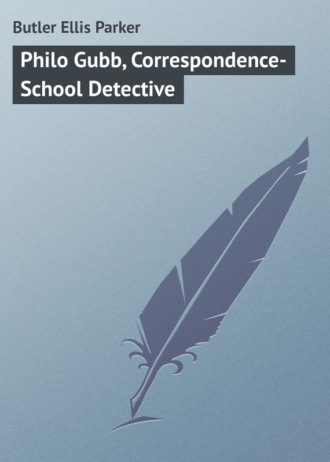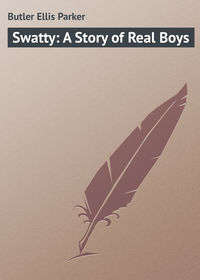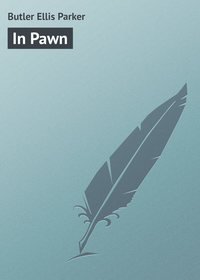 полная версия
полная версияPhilo Gubb, Correspondence-School Detective

Butler Ellis Parker
Philo Gubb, Correspondence-School Detective
THE HARD-BOILED EGG
Walking close along the wall, to avoid the creaking floor boards, Philo Gubb, paper-hanger and student of the Rising Sun Detective Agency’s Correspondence School of Detecting, tiptoed to the door of the bedroom he shared with the mysterious Mr. Critz. In appearance Mr. Gubb was tall and gaunt, reminding one of a modern Don Quixote or a human flamingo; by nature Mr. Gubb was the gentlest and most simple-minded of men. Now, bending his long, angular body almost double, he placed his eye to a crack in the door panel and stared into the room. Within, just out of the limited area of Mr. Gubb’s vision, Roscoe Critz paused in his work and listened carefully. He heard the sharp whistle of Mr. Gubb’s breath as it cut against the sharp edge of the crack in the panel, and he knew he was being spied upon. He placed his chubby hands on his knees and smiled at the door, while a red flush of triumph spread over his face.
Through the crack in the door Mr. Gubb could see the top of the washstand beside which Mr. Critz was sitting, but he could not see Mr. Critz. As he stared, however, he saw a plump hand appear and pick up, one by one, the articles lying on the washstand. They were: First, seven or eight half shells of English walnuts; second, a rubber shoe heel out of which a piece had been cut; third, a small rubber ball no larger than a pea; fourth, a paper-bound book; and lastly, a large and glittering brick of yellow gold. As the hand withdrew the golden brick, Mr. Gubb pressed his face closer against the door in his effort to see more, and suddenly the door flew open and Mr. Gubb sprawled on his hands and knees on the worn carpet of the bedroom.
“There, now!” said Mr. Critz. “There, now! Serves you right. Hope you hurt chuself!”
Mr. Gubb arose slowly, like a giraffe, and brushed his knees.
“Why?” he asked.
“Snoopin’ an’ sneakin’ like that!” said Mr. Critz crossly. “Scarin’ me to fits, a’most. How’d I know who ’twas? If you want to come in, why don’t you come right in, ’stead of snoopin’ an’ sneakin’ an’ fallin’ in that way?”
As he talked, Mr. Critz replaced the shells and the rubber heel and the rubber pea and the gold-brick on the washstand. He was a plump little man with a shiny bald head and a white goatee. As he talked, he bent his head down, so that he might look above the glasses of his spectacles; and in spite of his pretended anger he looked like nothing so much as a kindly, benevolent old gentleman – the sort of old gentleman that keeps a small store in a small village and sells writing-paper that smells of soap, and candy sticks out of a glass jar with a glass cover.
“How’d I know but what you was a detective?” he asked, in a gentler tone.
“I am,” said Mr. Gubb soberly, seating himself on one of the two beds. “I’m putty near a deteckative, as you might say.”
“Ding it all!” said Mr. Critz. “Now I got to go and hunt another room. I can’t room with no detective.”
“Well, now, Mr. Critz,” said Mr. Gubb, “I don’t want you should feel that way.”
“Knowin’ you are a detective makes me all nervous,” complained Mr. Critz; “and a man in my business has to have a steady hand, don’t he?”
“You ain’t told me what your business is,” said Mr. Gubb.
“You needn’t pretend you don’t know,” said Mr. Critz. “Any detective that saw that stuff on the washstand would know.”
“Well, of course,” said Mr. Gubb, “I ain’t a full deteckative yet. You can’t look for me to guess things as quick as a full deteckative would. Of course that brick sort of looks like a gold-brick – ”
“It is a gold-brick,” said Mr. Critz.
“Yes,” said Mr. Gubb. “But – I don’t mean no offense, Mr. Critz – from the way you look – I sort of thought – well, that it was a gold-brick you’d bought.”
Mr. Critz turned very red.
“Well, what if I did buy it?” he said. “That ain’t any reason I can’t sell it, is it? Just because a man buys eggs once – or twice – ain’t any reason he shouldn’t go into the business of egg-selling, is it? Just because I’ve bought one or two gold-bricks in my day ain’t any reason I shouldn’t go to sellin’ ’em, is it?”
Mr. Gubb stared at Mr. Critz with unconcealed surprise.
“You ain’t, – you ain’t a con’ man, are you, Mr. Critz?” he asked.
“If I ain’t yet, that’s no sign I ain’t goin’ to be,” said Mr. Critz firmly. “One man has as good a right to try his hand at it as another, especially when a man has had my experience in it. Mr. Gubb, there ain’t hardly a con’ game I ain’t been conned with. I been confidenced long enough; from now on I’m goin’ to confidence other folks. That’s what I’m goin’ to do; and I won’t be bothered by no detective livin’ in the same room with me. Detectives and con’ men don’t mix noways! No, sir!”
“Well, sir,” said Mr. Gubb, “I can see the sense of that. But you don’t need to move right away. I don’t aim to start in deteckating in earnest for a couple of months yet. I got a couple of jobs of paper-hanging and decorating to finish up, and I can’t start in sleuthing until I get my star, anyway. And I don’t get my star until I get one more lesson, and learn it, and send in the examination paper, and five dollars extra for the diploma. Then I’m goin’ at it as a reg’lar business. It’s a good business. Every day there’s more crooks – excuse me, I didn’t mean to say that.”
“That’s all right,” said Mr. Critz kindly. “Call a spade a spade. If I ain’t a crook yet, I hope to be soon.”
“I didn’t know how you’d feel about it,” explained Mr. Gubb. “Tactfulness is strongly advised into the lessons of the Rising Sun Deteckative Agency Correspondence School of Deteckating – ”
“Slocum, Ohio?” asked Mr. Critz quickly. “You didn’t see the ad. in the ‘Hearthstone and Farmside,’ did you?”
“Yes, Slocum, Ohio,” said Mr. Gubb, “and that is the paper I saw the ad. into; ‘Big Money in Deteckating. Be a Sleuth. We can make you the equal of Sherlock Holmes in twelve lessons.’ Why?”
“Well, sir,” said Mr. Critz, “that’s funny. That ad. was right atop of the one I saw, and I studied quite considerable before I could make up my mind whether ’twould be best for me to be a detective and go out and get square with the fellers that sold me gold-bricks and things by putting them in jail, or to even things up by sending for this book that was advertised right under the ‘Rising Sun Correspondence School.’ How come I settled to do as I done was that I had a sort of stock to start with, with a fust-class gold-brick, and some green goods I’d bought; and this book only cost a quatter of a dollar. And she’s a hummer for a quatter of a dollar! A hummer!”
He pulled the paper-covered book from his pocket and handed it to Mr. Gubb. The title of the book was “The Complete Con’ Man, by the King of the Grafters. Price 25 cents.”
“That there book,” said Mr. Critz proudly, as if he himself had written it, “tells everything a man need to know to work every con’ game there is. Once I get it by heart, I won’t be afraid to try any of them. Of course, I got to start in small. I can’t hope to pull off a wire-tapping game right at the start, because that has to have a gang. You don’t know anybody you could recommend for a gang, do you?”
“Not right offhand,” said Mr. Gubb thoughtfully.
“If you wasn’t goin’ into the detective business,” said Mr. Critz, “you’d be just the feller for me. You look sort of honest and not as if you was too bright, and that counts a lot. Even in this here simple little shell game I got to have a podner. I got to have a podner I can trust, so I can let him look like he was winnin’ money off of me. You see,” he explained, moving to the washstand, “this shell game is easy enough when you know how. I put three shells down like this, on a stand, and I put the little rubber pea on the stand, and then I take up the three shells like this, two in one hand and one in the other, and I wave ’em around over the pea, and maybe push the pea around a little, and I say, ‘Come on! Come on! The hand is quicker than the eye!’ And all of a suddent I put the shells down, and you think the pea is under one of them, like that – ”
“I don’t think the pea is under one of ’em,” said Mr. Gubb. “I seen it roll onto the floor.”
“It did roll onto the floor that time,” said Mr. Critz apologetically. “It most generally does for me, yet. I ain’t got it down to perfection yet. This is the way it ought to work – oh, pshaw! there she goes onto the floor again! Went under the bed that time. Here she is! Now, the way she ought to work is – there she goes again!”
“You got to practice that game a lot before you try it onto folks in public, Mr. Critz,” said Mr. Gubb seriously.
“Don’t I know that?” said Mr. Critz rather impatiently. “Same as you’ve got to practice snoopin’, Mr. Gubb. Maybe you thought I didn’t know you was snoopin’ after me wherever I went last night.”
“Did you?” asked Mr. Gubb, with surprise plainly written on his face.
“I seen you every moment from nine p. m. till eleven!” said Mr. Critz. “I didn’t like it, neither.”
“I didn’t think to annoy you,” apologized Mr. Gubb. “I was practicin’ Lesson Four. You wasn’t supposed to know I was there at all.”
“Well, I don’t like it,” said Mr. Critz. “’Twas all right last night, for I didn’t have nothin’ important on hand, but if I’d been workin’ up a con’ game, the feller I was after would have thought it mighty strange to see a man follerin’ me everywhere like that. If you went about it quiet and unobtrusive, I wouldn’t mind; but if I’d had a customer on hand and he’d seen you it would make him nervous. He’d think there was a – a crazy man follerin’ us.”
“I was just practicin’,” apologized Mr. Gubb. “It won’t be so bad when I get the hang of it. We all got to be beginners sometime.”
“I guess so,” said Mr. Critz, rearranging the shells and the little rubber pea. “Well, I put the pea down like this, and I dare you to bet which shell she’s goin’ to be under, and you don’t bet, see? So I put the shells down, and you’re willin’ to bet you see me put the first shell over the pea like this. So you keep your eye on that shell, and I move the shells around like this – ”
“She’s under the same shell,” said Mr. Gubb.
“Well, yes, she is,” said Mr. Critz placidly, “but she hadn’t ought to be. By rights she ought to sort of ooze out from under whilst I’m movin’ the shells around, and I’d ought to sort of catch her in between my fingers and hold her there so you don’t see her. Then when you say which shell she’s under, she ain’t under any shell; she’s between my fingers. So when you put down your money I tell you to pick up that shell and there ain’t anything under it. And before you can pick up the other shells I pick one up, and let the pea fall on the stand like it had been under that shell all the time. That’s the game, only up to now I ain’t got the hang of it. She won’t ooze out from under, and she won’t stick between my fingers, and when she does stick, she won’t drop at the right time.”
“Except for that, you’ve got her all right, have you?” asked Mr. Gubb.
“Except for that,” said Mr. Critz; “and I’d have that, only my fingers are stubby.”
“What was it you thought of having me do if I wasn’t a deteckative?” asked Mr. Gubb.
“The work you’d have to do would be capping work,” said Mr. Critz. “Capper – that’s the professional name for it. You’d guess which shell the ball was under – ”
“That would be easy, the way you do it now,” said Mr. Gubb.
“I told you I’d got to learn it better, didn’t I?” asked Mr. Critz impatiently. “You’d be capper, and you’d guess which shell the pea was under. No matter which you guessed, I’d leave it under that one, so’d you’d win, and you’d win ten dollars every time you bet – but not for keeps. That’s why I’ve got to have an honest capper.”
“I can see that,” said Mr. Gubb; “but what’s the use lettin’ me win it if I’ve got to bring it back?”
“That starts the boobs bettin’,” said Mr. Critz. “The boobs see how you look to be winnin’, and they want to win too. But they don’t. When they bet, I win.”
“That ain’t a square game,” said Mr. Gubb seriously, “is it?”
“A crook ain’t expected to be square,” said Mr. Critz. “It stands to reason, if a crook wants to be a crook, he’s got to be crooked, ain’t he?”
“Yes, of course,” said Mr. Gubb. “I hadn’t looked at it that way.”
“As far as I can see,” said Mr. Critz, “the more I know how a detective acts, the better off I’ll be when I start in doin’ real business. Ain’t that so? I guess, till I get the hang of things better, I’ll stay right here.”
“I’m glad to hear you say so, Mr. Critz,” said Mr. Gubb with relief. “I like you, and I like your looks, and there’s no tellin’ who I might get for a roommate next time. I might get some one that wasn’t honest.”
So it was agreed, and Mr. Critz stood over the washstand and manipulated the little rubber pea and the three shells, while Mr. Gubb sat on the edge of the bed and studied Lesson Eleven of the “Rising Sun Detective Agency’s Correspondence School of Detecting.”
When, presently, Mr. Critz learned to work the little pea neatly, he urged Mr. Gubb to take the part of capper, and each time Mr. Gubb won he gave him a five-dollar bill. Then Mr. Gubb posed as a “boob” and Mr. Critz won all the money back again, beaming over his spectacle rims, and chuckling again and again until he burst into a fit of coughing that made him red in the face, and did not cease until he had taken a big drink of water out of the wash-pitcher. Never had he seemed more like a kindly old gentleman from behind the candy counter of a small village. He hung over the washstand, manipulating the little rubber pea as if fascinated.
“Ain’t it curyus how a feller catches onto a thing like that all to once?” he said after a while. “If it hadn’t been that I was so anxious, I might have fooled with that for weeks and weeks and not got anywheres with it. I do wisht you could be my capper a while anyway, until I could get one.”
“I need all my time to study,” said Mr. Gubb. “It ain’t easy to learn deteckating by mail.”
“Pshaw, now!” said Mr. Critz. “I’m real sorry! Maybe if I was to pay you for your time and trouble five dollars a night? How say?”
Mr. Gubb considered. “Well, I dunno!” he said slowly. “I sort of hate to take money for doin’ a favor like that.”
“Now, there ain’t no need to feel that way,” said Mr. Critz. “Your time’s wuth somethin’ to me – it’s wuth a lot to me to get the hang of this gold-brick game. Once I get the hang of it, it won’t be no trouble for me to sell gold-bricks like this one for all the way from a thousand dollars up. I paid fifteen hundred for this one myself, and got it cheap. That’s a good profit, for this brick ain’t wuth a cent over one hundred dollars, and I know, for I took it to the bank after I bought it, and that’s what they was willin’ to pay me for it. So it’s easy wuth a few dollars for me to have help whilst I’m learnin’. I can easy afford to pay you a few dollars, and to pay a friend of yours the same.”
“Well, now,” said Mr. Gubb, “I don’t know but what I might as well make a little that way as any other. I got a friend – ” He stopped short. “You don’t aim to sell the gold-brick to him, do you?”
Mr. Critz’s eyes opened wide behind their spectacles.
“Land’s sakes, no!” he said.
“Well, I got a friend may be willing to help out,” said Mr. Gubb. “What’d he have to do?”
“You or him,” said Mr. Critz, “would be the ‘come-on,’ and pretend to buy the brick. And you or him would pretend to help me to sell it. Maybe you better have the brick, because you can look stupid, and the feller that’s got the brick has got to look that.”
“I can look anyway a’most,” said Mr. Gubb with pride.
“Do tell!” said Mr. Critz, and so it was arranged that the first rehearsal of the gold-brick game should take place the next evening, but as Mr. Gubb turned away Mr. Critz deftly slipped something into the student detective’s coat pocket.
It was toward noon the next day that Mr. Critz, peering over his spectacles and avoiding as best he could the pails of paste, entered the parlor of the vacant house where Mr. Gubb was at work.
“I just come around,” said Mr. Critz, rather reluctantly, “to say you better not say nothing to your friend. I guess that deal’s off.”
“Pshaw, now!” said Mr. Gubb. “You don’t mean so!”
“I don’t mean nothing in the way of aspersions, you mind,” said Mr. Critz with reluctance, “but I guess we better call it off. Of course, so far as I know, you are all right – ”
“I don’t know what you’re gettin’ at,” said Mr. Gubb. “Why don’t you say it?”
“Well, I been buncoed so often,” said Mr. Critz. “Seem’s like any one can get money from me any time and any way, and I got to thinkin’ it over. I don’t know anything about you, do I? And here I am, going to give you a gold-brick that cost me fifteen hundred dollars, and let you go out and wait until I come for it with your friend, and – well, what’s to stop you from just goin’ away with that brick and never comin’ back?”
Mr. Gubb looked at Mr. Critz blankly.
“I’ve went and told my friend,” he said. “He’s all ready to start in.”
“I hate it, to have to say it,” said Mr. Critz, “but when I come to count over them bills I lent you to cap the shell game with, there was a five-dollar one short.”
“I know,” said Gubb, turning red. “And if you go over there to my coat, you’ll find it in my pocket, all ready to hand back to you. I don’t know how I come to keep it in my pocket. Must ha’ missed it, when I handed you back the rest.”
“Well, I had a notion it was that way,” said Mr. Critz kindly. “You look like you was honest, Mr. Gubb. But a thousand-dollar gold-brick, that any bank will pay a hundred dollars for – I got to get out of this way of trustin’ everybody – ”
Mr. Critz was evidently distressed.
“If ’twas anybody else but you,” he said with an effort, “I’d make him put up a hundred dollars to cover the cost of a brick like that whilst he had it. There! I’ve said it, and I guess you’re mad!”
“I ain’t mad,” protested Mr. Gubb, “’long as you’re goin’ to pay me and Pete, and it’s business; I ain’t so set against puttin’ up what the brick is worth.”
Mr. Critz heaved a deep sigh of relief.
“You don’t know how good that makes me feel,” he said. “I was almost losin’ what faith in mankind I had left.”
Mr. Gubb ate his frugal evening meals at the Pie Wagon, on Willow Street, just off Main, where, by day, Pie-Wagon Pete dispensed light viands; and Pie-Wagon Pete was the friend he had invited to share Mr. Critz’s generosity. The seal of secrecy had been put on Pie-Wagon Pete’s lips before Mr. Gubb offered him the opportunity to accept or decline; and when Mr. Gubb stopped for his evening meal, Pie-Wagon Pete – now off duty – was waiting for him. The story of Mr. Critz and his amateur con’ business had amused Pie-Wagon Pete. He could hardly believe such utter innocence existed. Perhaps he did not believe it existed, for he had come from the city, and he had had shady companions before he landed in Riverbank. He was a sharp-eyed, red-headed fellow, with a hard fist, and a scar across his face, and when Mr. Gubb had told him of Mr. Critz and his affairs, he had seen an opportunity to shear a country lamb.
“How goes it for to-night, Philo?” he asked Mr. Gubb, taking the stool next to Mr. Gubb, while the night man drew a cup of coffee.
“Quite well,” said Mr. Gubb. “Everything is arranged satisfactory. I’m to be on the old house-boat by the wharf-house on the levee at nine, with it.” He glanced at the night man’s back and lowered his voice. “And Mr. Critz will bring you there.”
“Nine, eh?” said Pie-Wagon. “I meet him at your room, do I?”
“You meet him at the Riverbank Hotel at eight-forty-five,” said Mr. Gubb. “Like it was the real thing. I’m goin’ over to my room now, and give him the money – ”
“What money?” asked Pie-Wagon Pete quickly.
“Well, you see,” said Mr. Gubb, “he sort of hated to trust the – trust it out of his hands without a deposit. It’s the only one he has. So I thought I’d put up a hundred dollars. He’s all right – ”
“Oh, sure!” said Pie-Wagon. “A hundred dollars, eh?”
He looked at Mr. Gubb, who was eating a piece of apple pie hand-to-mouth fashion, and studied him in a new light.
“One hundred dollars, eh?” he repeated thoughtfully. “You give him a hundred-dollar deposit now and he meets you at nine, and me at eight-forty-five, and the train leaves for Chicago at eight-forty-three, halfway between the house-boat and the hotel! Say, Gubby, what does this old guy look like?”
Mr. Gubb, albeit with a tongue unused to description, delineated Mr. Critz as best he could, and as he proceeded, Pie-Wagon Pete became interested.
“Pinkish, and bald? Top of his head like a hard-boiled egg? He ain’t got a scar across his face? The dickens he has! Short and plump, and a reg’lar old nice grandpa? Blue eyes? Say, did he have a coughin’ spell and choke red in the face? Well, sir, for a brand-new detective, you’ve done well. Listen, Jim: Gubby’s got the Hard-Boiled Egg!”
The night man almost dropped his cup of coffee.
“Go ’way!” he said. “Old Hard-Boiled? Himself?”
“That’s right! And caught him with the goods. Say, listen, Gubby!”
For five minutes Pie-Wagon Pete talked, while Mr. Gubb sat with his mouth wide open.
“See?” said Pie-Wagon at last. “And don’t you mention me at all. Don’t mention no one. Just say to the Chief: ‘And havin’ trailed him this far, Mr. Wittaker, and arranged to have him took with the goods, it’s up to you?’ See? And as soon as you say that, have him send a couple of bulls with you, and if they can do it, they’ll nab Old Hard-Boiled just as he takes your cash. And Old Sleuth and Sherlock Holmes won’t be in it with you when to-morrow mornin’s papers come out. Get it?”
Mr. Gubb got it. When he entered his bedroom, Mr. Critz was waiting for him. It was slightly after eight o’clock; perhaps eight-fifteen. Mr. Critz had what appeared to be the gold-brick neatly wrapped in newspaper, and he looked up with his kindly blue eyes. He had been reading the “Complete Con’ Man,” and had pushed his spectacles up on his forehead as Mr. Gubb entered.
“I done that brick up for you,” he said, indicating it with his hand, “so’s it wouldn’t glitter whilst you was goin’ through the street. If word got passed around there was a gold-brick in town, folks might sort of get suspicious-like. Nice night for goin’ out, ain’t it? Got a letter from my wife this aft’noon,” he chuckled. “She says she hopes I’m doin’ well. Sally’d have a fit if she knew what business I was goin’ into. Well, time’s gettin’ along – ”
“I brung the money,” said Mr. Gubb, drawing it from his pocket.
“Don’t seem hardly necess’ry, does it?” said Mr. Critz mildly. “But I s’pose it’s just as well. Thankee, Mister Gubb. I’ll just pile into my coat – ”
Mr. Gubb had picked up the gold-brick, and now he let it fall. Once more the door flew open, but this time it opened for three stalwart policemen, whose revolvers pointed unwaveringly at Mr. Critz. The plump little man gave one glance, and put up his hands.
“All right, boys, you’ve got me,” he said in quite another voice, and allowed them to seize his arms. He paid no attention to the police, but at Mr. Gubb, who was tearing the wrapper from what proved to be but a common vitrified paving-brick, he looked long and hard.
“Say,” said Mr. Critz to Mr. Gubb, “I’m the goat. You stung me all right. You worked me to a finish. I thought I knew all of you from Burns down, but you’re a new one to me. Who are you, anyway?”
Mr. Gubb looked up.
“Me?” he said with pride. “Why – why – I’m Gubb, the foremost deteckative of Riverbank, Iowa.”
THE PET
On the morning following his capture of the Hard-Boiled Egg, the “Riverbank Eagle” printed two full columns in praise of Detective Gubb and complimented Riverbank on having a superior to Sherlock Holmes in its midst.
“Mr. Philo Gubb,” said the “Eagle,” “has thus far received only eleven of the twelve lessons from the Rising Sun Detective Agency’s Correspondence School of Detecting, and we look for great things from him when he finally receives his diploma and badge. He informed us to-day that he hopes to begin work on the dynamite case soon. With the money he will receive for capturing the Hard-Boiled Egg, Mr. Gubb intends to purchase eighteen complete disguises from the Supply Department of the Rising Sun Detective Agency, Slocum, Ohio. Mr. Gubb wishes us to announce that until the disguises arrive he will continue to do paper-hanging, decorating, and interior painting at reasonable rates.”









